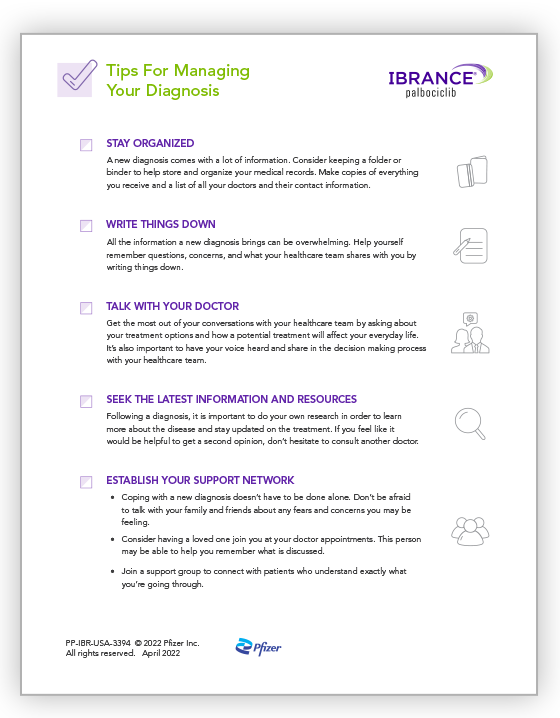A METASTATIC BREAST CANCER (mBC) DIAGNOSIS can be shocking and even scary. That's understandable. What's important is what comes next for you.
Consider making time to map out a treatment plan with your doctor. In doing so, you may wonder about how treatment works, how to get started, or how to stay on track. All are common questions. And all are OK to ask.
Also, know that IBRANCE.com offers resources and support—at this moment and whenever it can be of help. You, and those who care for you, are not alone.
Treatment Considerations
Choosing a treatment is a very important decision. You have options, and your doctor has information that may help. Take time to talk with your doctor about treatment decisions as well as any questions you or your loved ones may have. Having a meaningful conversation can help make a difference.

What To Consider
When choosing a treatment, you may have questions about its effectiveness, potential side effects, and even changes that it may have on your lifestyle. All are good starting points for a discussion with your doctor—one that can lead to the treatment that’s right for you.

Know Your Subtype
Knowing your subtype is important because there are different types of mBC. Your doctor can give you a test and, based on the results, tell you which type of metastatic breast cancer you have.

Partner With Your Doctor
As you begin to weigh options, be sure that your voice is heard and your questions are answered. You play a central role in your treatment decision so it's vital that your doctor knows what’s important to you and understands your goals. The decision-making process is one shared between you and your healthcare team. Working together can help you make informed choices.
Veronica’s Diagnosis Story
Take a moment to hear how Veronica, an IBRANCE Ambassador, felt about her mBC diagnosis and the importance of advocating for yourself.
ES Haga clic aquí para ver el video y obtener acceso a información adicional en español
https://players.brightcove.net/1852113022001/JpBcT6sXX_default/index.html?videoId=6327819461112
Ambassadors were asked to share their personal stories about IBRANCE. All content was accurate at the time of publication and may have since changed.

WHAT QUESTIONS TO ASK
Find helpful questions to ask your doctor to help you navigate your treatment options.
Tips & Support
“What now?” That may have been one of your first thoughts after receiving an mBC diagnosis. Allowing yourself time to process the diagnosis and organize your thoughts is vital. If you’re feeling overwhelmed, there are steps you can take that may help lead to better moments.
Download the following Tips Sheet, which is designed to help support you as you manage your diagnosis:
Newly Diagnosed Tips Sheet

Tips and supportive resources you can print or email to yourself and loved ones.

“It is easy to lose yourself in a diagnosis like mBC. You need people to help you get through this difficult time.”
Chris, Ambassador
Newly Diagnosed FAQs
A CDK 4/6 inhibitor is a type of treatment that works to disrupt the activity of cell growth and division by preventing certain proteins (called CDK 4 and CDK 6) from telling the cell that it needs to grow and divide.
IBRANCE is in a class of drugs called CDK 4/6 inhibitors that work to put the brakes on cell growth and division in both healthy and cancer cells. This helps slow the progression of cancer, but it can also cause side effects, some of which are serious. Please see the Important Safety Information to learn more.

Talking With Friends and Family About Your Diagnosis
It’s understandable that those who care for you will also want to learn more about your diagnosis. Discussing your diagnosis with friends and family isn’t always easy, but it can be helpful—for you and for them.
It’s important to remember that your story is yours alone. How you choose to tell it is entirely up to you. Share as much or as little as you are comfortable with, and only as you see fit.
Additional insights and advice are available. See Tips On Living With mBC.
For Those Newly Prescribed IBRANCE
The sections below offer information specifically helpful to those who have been newly prescribed IBRANCE as well as to those who care for them.

Making Your Support Needs A Priority. Together.
Pfizer Oncology TogetherTM is a personalized patient support program to help you and your caregiver throughout IBRANCE treatment. If needed, we can work with you to help identify financial assistance options for your prescribed IBRANCE. And if you need help with some of the day-to-day challenges you're facing, we can connect you to a dedicated Care Champion who has social work experience and will offer you support resources. Because when it comes to support, we're in this together.
For live personalized support, call 1-844-9-IBRANCE.

Connect With Other Patients Taking IBRANCE

The IBRANCE Ambassador Mentor Program offers patients currently taking IBRANCE—as well as their caregivers—the opportunity to speak with a Patient or Caregiver Ambassador on a personal, one-on-one phone call. To get set up with a mentor, call 1-844-390-8696 or register online.
Mentors are not medical or mental health professionals and do not provide any medical advice. Please contact your healthcare team for medical information.

